The following is a list of what’s lacking in the evolutionary theory that we have been told is the basis of all science:
- Evolutionists claim that everything we see (or ever will see) and feel arose from lesser-complex organisms.
- Single organisms arose spontaneously from a primordial soup of chemicals that randomly came together at the beginning of what we now define as “life.”
- These basic life forms supposedly replicated (duplicated) themselves and mutated into more complex forms over billions of years.
- No one saw these processes take place, and no scientist or group of scientists has ever replicated the primordial beginning of life from pure chemistry to biology.[1]
- Given these assumptions, we are nothing more than bags of meat and bones with electrical energy coursing through us. (Of course, we are more than this, but not because of evolutionary assumptions.)
- Evolutionists claim that the stuff of the universe was originally a super-heated, super-concentrated mass of inert material.[2] (Of course, this is speculation since no one was present at the beginning to record the beginning.)
- The extraordinary heat alone of this original primordial “stuff” would have made the potential for life to spontaneously generate impossible to evolve into anything resembling life let alone the extraordinary array of life forms we seen today.
- There is no way to get life from non-life. Something from nothing is mathematically, scientifically, and logically impossible.
- The impossibility of spontaneous generation is one of the fundamental tenets of science that children learn, and yet it is a basic tenet of evolutionary scientists whether they care to admit it or not.
- In addition to being unable to account for life from non-life, there are the intangibles that are equally impossible to account for given evolutionary and materialist assumptions—the non-physical mind, the non-physical “laws” of logic, non-physical reason, the immateriality of morality, and the impossibility of organized INFORMATION to make everything work. Not only can’t evolutionists account for the hardware but they can’t account for the software.
- We need to keep reminding evolutionists that they have not explained or demonstrated through empirical evidence how even the simplest organisms got their start in a hostile chemical soup billions of years ago let alone evolved into what we are today.
- Information theorist Hubert Yockey argued that chemical evolutionary research faces the following problem: “Research on the origin of life seems to be unique in that the conclusion has already been authoritatively accepted…. What remains to be done is to find the scenarios which describe the detailed mechanisms and processes by which this happened. One must conclude that, contrary to the established and current wisdom a scenario describing the genesis of life on earth by chance and natural causes which can be accepted on the basis of fact and not faith has not yet been written.”[3]
- In a book he wrote in 1992, Yockey argued that the idea of abiogenesis (life from non-life) from a primordial soup is a failed paradigm: “Although at the beginning the paradigm was worth consideration, now the entire effort in the primeval soup paradigm is self-deception on the ideology of its champions.…”[4]
- Of course, the evolutionist must explain the source of the information that makes up what we know as DNA.
· Was information part of the original primordial world?
· Did information arise spontaneously?
· How did information organize itself to bring about our designed world?
- The computer analogy.
· The components of a computer did not arise randomly.
· Computers didn’t put themselves together.
· The non-material information needed to run a computer was designed.
· Without the program, a computer is worthless.
· The brain is much more complex than a computer, does not act like a computer, and information cannot be downloaded into the brain as it can in a computer.
- To begin with chemicals and end with humans (let alone everything in between) requires changes that increase the genetic information up the evolutionary ladder. This would be like saying 2 plus 2 equals 5000.
- “The calculated mass of the universe ranges anywhere from 10 to the power of 53 kg to 10 to the power of 60 kg and is complicated by the fact that there is invisible matter we cannot see, called dark matter.”[5] Does “invisible matter” exist? God is said to be invisible. Does this disqualify Him from existing or put Him in the category of dark matter and therefore account for His existence?
- “ONE of the mysteries of the universe is why it should speak the language of mathematics. Numbers and the relationships between them are, after all, just abstract reasoning. Yet mathematics has shown itself to be particularly adept at describing both the contents of the universe and the forces that act on them. Now comes a paper which argues that one branch of the subject—geometry—could form the basis of all the laws of physics.”[6]
19. “A rational worldview must provide for the preconditions of intelligibility. These are conditions that must be true before we can know anything about the universe. The preconditions of intelligibility are things that most people take for granted. For example, that our memories are basically reliable is something that we all assume before we investigate the universe. Another would be the general reliability of our senses. Without this assumption, science would be impossible. We could draw no conclusions from any experiment if our observations of the experiment are unreliable. Also, we all presume that there are laws of logic that govern correct reasoning. How could we prove that the laws of logic are correct? We would have to first assume that they are true in order to begin a logical proof. Atheists and Christians both assume the preconditions of intelligibility in order to know anything. But only the Christian can justify them. Without justification for things we take for granted, we can’t really know if any of our thinking our observations are correct. Proverbs 1:7 says “The fear of the Lord is the beginning of knowledge…” Knowledge begins with a respectful submission to the biblical God. Begin anywhere else and you cannot justify logic, morality or beliefs about anything. — Jason Lisle

If Evolution is Right Can Anything be Wrong?
Atheism cannot account for rationality, love or morality. This does not mean that atheists are always irrational, unloving, and immoral, but it does mean that they can’t account for rationality, love, and morality given their assumptions about the origins of the universe and our accidental place in it.












